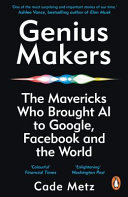

Genius Makers delves into the history and evolution of artificial intelligence, tracing its roots from early theoretical concepts to modern applications. It highlights key milestones, such as the Turing Test, the development of neural networks, and the advent of deep learning. The book emphasizes how these advancements have shifted AI from a niche academic pursuit to a mainstream technology with far-reaching implications. By exploring the contributions of pioneers in the field, the narrative illustrates how collaborative efforts and competition have driven innovation. This evolution is not just about technological progress; it also reflects changes in societal attitudes towards AI, including fears and hopes regarding its potential impact on jobs, ethics, and human existence.
Continue readingOne of the central themes of Genius Makers is the critical role that data plays in the development of AI systems. The book explains how the availability of vast amounts of data has fueled advancements in machine learning, particularly in training algorithms to recognize patterns and make predictions. It discusses the importance of data quality and diversity, as well as the ethical considerations surrounding data collection and usage. The narrative includes case studies of companies that have successfully leveraged data to enhance their AI capabilities, illustrating the transformative power of data in various industries, from healthcare to finance.
Continue readingGenius Makers emphasizes that behind every breakthrough in AI technology are the people who create and refine these systems. The book profiles key figures in the AI community, showcasing their motivations, challenges, and the collaborative nature of their work. It highlights the importance of interdisciplinary approaches, where insights from psychology, neuroscience, and linguistics inform AI development. Furthermore, the narrative addresses the need for diverse teams in AI, arguing that varied perspectives lead to more robust and ethical technologies. The human element extends to the societal implications of AI, as the book discusses how technologists must consider the broader impact of their work on humanity.
Continue readingThe book provides an in-depth look at the competitive landscape of the AI industry, detailing how major tech companies like Google, Microsoft, and Facebook are vying for dominance. It explores the strategies these companies employ, including acquisitions, partnerships, and research investments. The narrative also touches on the geopolitical aspects of AI, emphasizing how nations are racing to lead in this critical technology. By examining the motivations behind these corporate and national strategies, Genius Makers illustrates the high stakes involved in AI development and the potential consequences for global power dynamics.
Continue readingA significant portion of Genius Makers is dedicated to the ethical considerations surrounding AI technology. The book discusses the potential risks associated with AI, such as bias in algorithms, privacy concerns, and the implications of autonomous systems. It emphasizes the importance of developing ethical frameworks to guide AI development and deployment. The narrative includes perspectives from ethicists and technologists, advocating for a responsible approach to AI that prioritizes human welfare and societal good. By highlighting real-world examples of ethical dilemmas, the book encourages readers to think critically about the responsibilities of AI creators and users.
Continue readingGenius Makers concludes with a forward-looking perspective on the future of AI. It examines emerging trends, such as the rise of explainable AI, advancements in natural language processing, and the integration of AI into everyday life. The book speculates on how these developments could shape various sectors, including education, healthcare, and transportation. It also addresses potential challenges, such as regulatory hurdles and public acceptance of AI technologies. By providing insights into the future trajectory of AI, the book invites readers to consider how they can engage with and influence the ongoing evolution of this transformative technology.
Continue readingThe final key idea in Genius Makers is the intersection of AI and societal change. The book discusses how AI technologies are not just tools but catalysts for broader social transformation. It explores the implications of AI on employment, education, and interpersonal relationships, urging readers to consider how these changes will affect their lives and communities. The narrative also emphasizes the importance of public discourse in shaping the future of AI, advocating for informed participation in discussions about technology's role in society. By framing AI as a societal issue, the book encourages a holistic understanding of its impact beyond just technical advancements.
Continue readingThe reading time for Genius Makers depends on the reader's pace. However, this concise book summary covers the 7 key ideas from Genius Makers, allowing you to quickly understand the main concepts, insights, and practical applications in around 25 min.
Genius Makers is definitely worth reading. The book covers essential topics including The Evolution of AI, The Role of Data, The Human Element in AI Development, providing practical insights and actionable advice. Whether you read the full book or our concise summary, Genius Makers delivers valuable knowledge that can help you improve your understanding and apply these concepts in your personal or professional life.
Genius Makers was written by Cade Metz.
If you enjoyed Genius Makers by Cade Metz and want to explore similar topics or deepen your understanding, we highly recommend these related book summaries:
These books cover related themes, complementary concepts, and will help you build upon the knowledge gained from Genius Makers. Each of these summaries provides concise insights that can further enhance your understanding and practical application of the ideas presented in Genius Makers.